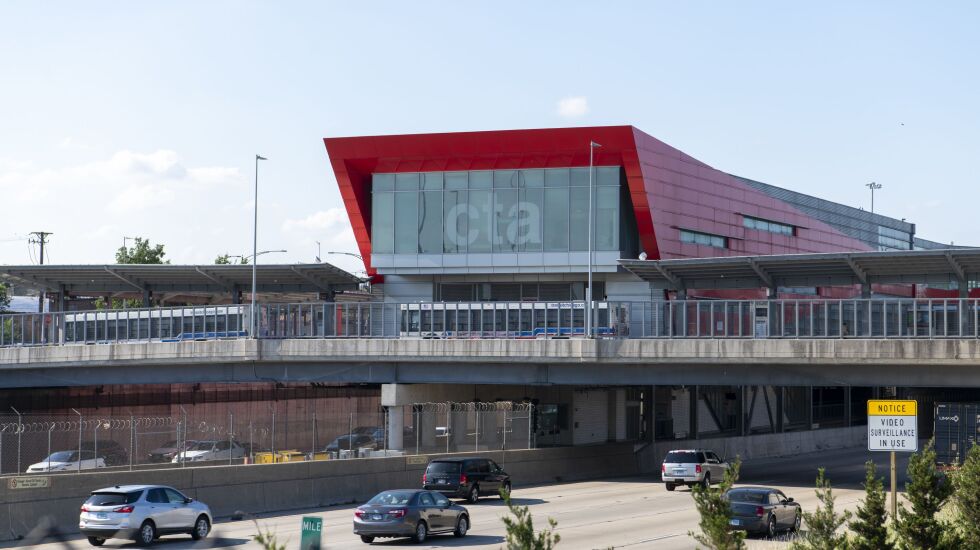
A mass transit dream decades in the making took a giant step closer to becoming a Chicago reality on Monday.
In five different votes during a daylong meeting, the City Council’s Finance Committee agreed to create a new transit tax increment finance district to bankroll $959 million of the $3.6 billion cost of extending the CTA’s Red Line from 95th Street to 130th Street.
Downtown Ald. Brendan Reilly (42nd) has raised serious concerns about committing nearly $1 billion in TIF money to expand a CTA system plagued by violent crime and spotty service.
One of at least five alderpersons whose property tax growth or “increment” over the next 35 years would be siphoned away to bankroll the Red Line south extension, Reilly has condemned the CTA as a “dumpster fire” and questioned why anyone would feel safe enough to ride the extension.
But Monday’s debate included none of those concerns.
Instead, it was focused on finally delivering what CTA President Dorval Carter Jr. called mass transit “fairness” to the “only community” in Chicago without “access to rail” service.
“We have an opportunity ... to correct what has been [decades] of wrongdoing for this community. ... It is important that we make those changes. The impact that this investment will have on this community will be transformative. It is going to change the way people live and see the city as a whole,” he said.
Calling Monday’s vote “one of the biggest visionary decisions” the City Council will make, Carter told alderpersons, “I wish I had other places I could go. I’m happy to talk to you about where I went. But right now, today, at this moment, I need the help of the City Council to make this project a reality.”
The primary opposition came from two alderpersons: Budget Committee Chair Pat Dowell (3rd) and former longtime Transportation Committee Chairman Anthony Beale (9th), the City Council’s biggest champion for the Red Line South extension because his Far South Side constituents would benefit the most.
Beale argued that creating an even bigger version of the mass transit TIF that funded the Red-Purple Modernization Project lets the state of Illinois off the hook.
“I believe that we should be using our capital — from your [CTA] office to the mayor’s office to Durbin’s office — to force the federal government to give us the 80-20 split without letting Springfield off the hook,” Beale told Carter.
“Springfield should be giving us some money on this as well. And not $959 million coming off the backs of the people here in the city of Chicago.”
The new TIF district is controversial because it would cover a half-mile on either side of the Red Line between Madison Street and Pershing Road, and use property tax growth over the next 35 years to help pay for the extension.
Dowell argued that “everyone should pay” for the Red Line South extension — not just five wards, including her own.
“When you take TIF money from one neighborhood and spend it in another, it really feels like theft. It feels low down and dirty,” Dowell told Carter.
“Because these benefits are citywide, everyone should have skin in the game of paying for this project. This has to include the entire city, including the state of Illinois and Cook County. It cannot be five wards. That’s porting on steroids. ... This takes money from one area of the city and ships it miles away from the residents who generated the funding and live in these communities that still have many issues that need to be addressed.”
Dowell noted that all of the communities along the North Side Red Line that contributed to funding the modernization “got the benefit in terms of better service, shorter commute times, more trains.”
Not so for the Red Line South TIF, where “five wards pay but don’t nearly see any of the benefits,” she said.
“I’m also very concerned about taking away billions of dollars from the general fund by creating a TIF to pay for the extension. Year after year, we face financial challenges as a city and work hard to close any budget gaps. This would not only make that more difficult, it would take away huge amounts of money ... we need to ... pay for the things our communities need like public safety, affordable housing, clean drinking water and more,” she said.
Leah Mooney, director of strategic planning and policy for the CTA, said the 5.6-mile extension will shave “up to 30 minutes from the average trip” of Far South Side residents who now endure the “longest commutes” in the Chicago area. It will put “58% more jobs within a reasonable, 45-minute commute,” she said.







